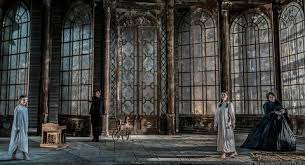Wagner: Lohengrin
Staatsoper Stuttgart, Cornelius Meister
BELAIR BAC 475
Recent productions of Lohengrin have tended to be either dull and traditional or wildly over the top. This is thankfully the exception. Arpad Schilling’s finely nuanced approach is utterly convincing and yet unlike anything one is likely to have encountered before. He ditches the super-natural. Lohengrin simply appears at the right time out of the chorus rather than magically arriving by swan. The chorus, all highly individualised, are closer to the Bartered Bride than the regimented forces we have become used to from Bayreuth. It adds a whole new level to the work. Telramund – a nasty older man in Martin Gantner’s interpretation – is clearly disliked by the crowd and they need a hero to take him on. ‘Lohengrin’ is pushed forward to do the job. Does he actually believe what he is saying or is it all an illusion? In the final Grail narration it is as if he feels compelled to tell them but is unsure he believes it himself. It is gripping and convincing throughout – even if the unexpected ending stretches us somewhat out of our comfort zone.
To all of this can be added some of the finest, and often most lyrical, singing I have heard in a long time. Michael Konig is a splendid Lohengrin, as far removed from the conventional hero as one could imagine yet warmly convincing. Goran Jurik’s Heinrich is a somewhat jumped up local politician who keeps bringing God into the conversation, much to the annoyance of the chorus. Simone Schneider is a reluctant, almost other-worldly Elsa, quite unlike the quick witted Ortrud of Okka von der Damerau.
Above all, Cornelius Meister’s gentle coaxing of the orchestra is masterful, creating some of the most lush and romantic sounds I can recall for some time.
This may challenge your pre-conceptions but I can’t recommend it too highly.
Casta Diva
Vanessa Benelli Mosell, piano
DECCA 4855290
Piano arrangements of familiar opera pieces were popular with 19th century composers, none more so than Liszt who has four separate arrangements here. Alongside these sit lesser known but engaging versions drawn from Rossini, Bellini and even Puccini. The most unexpected is surely from Busoni. His Turandots Frauengemach is based on Greensleeves! Vanessa Benelli Mosell brings a lightness of touch to her genuine virtuosity which is consistently pleasing.
Christoph Graupner: Bassoon Cantatas
Sergio Azzolini, bassoon, Kirchheimer BachConsort, Florian Heyerick
CPO 555 353-2
There are rarities and then there is the totally unexpected. The bassoon rarely gets into the limelight (I should know – I played bassoon while at school) but here it is the guiding light behind six beautifully crafted cantatas. Without making it into a solo instrument, Graupner gently draws attention to the many strengths of the instrument and the lyrical beauty of its musical lines when it is allowed to show them. A rarity – but one worth exploring.
Beethoven transformed Vol 2
Boxwood & Brass
RESONUS RES 10270
These are hugely enjoyable and the arrangements work remarkably well. The music for Egmont is skilfully reworked so that the incidental pieces fit comfortably into the end of the overture itself. If the anonymous arrangement of the Pathetique is not quite as good, the rendition of the Seventh Symphony certainly is, with the dance rhythms and sense of joy evident throughout.
Brahms: chamber music
Frank Gemmill, horn, Danile Grimwood, piano, Marquise Gilmore, violin
BIS 2478
The CD opens with a transcription of the Scherzo in C minor, followed by an arrangement of the cello sonata Op38 for horn and piano. Only the final E flat major trio is actually for the three instruments, but realistically the arrangements are so well crafted that one would not know unless one had a sound knowledge of the originals. Warmly convincing throughout.
Inviolata
Jacob Heringman, lute and vihuela
INVENTA INV 1004
I had not come across a vihuela before. It is a 15th century Spanish instrument, shaped like a guitar but strung like a lute. Realistically, unless you were a real aficionado I doubt you would know the difference simply by listening, but this is a very pleasing release. All the short works are Marian motets by Josquin des Prez arranged by Jacob Heringman for lute and vihuela. They work remarkably well and nothing in their quietly contemplative way seems forced or out of order. A lovely disc to meditate to.
A Bag of Bagatelles: Beethoven and Birtwistle
Nicolas Hodges, piano
CONCEPT WERGO WER 6810 2
This is a fascinating combination though I can see not necessarily to everyone’s taste. Nicolas Hodges has chosen three works by Beethoven that stretch the formats they inhabit. The Op77 Fantasy can seem shapeless and indeterminate, but put alongside the fluidity of Birtwistle’s Variations from the Golden Mountain it seems a mirror of good design. The final two pieces are gently tongue in cheek. Beethoven’s brief Allegretto woo 61 leads us into Birtwistle’s Dance of the Metro-gnome – a piece for children which requires a strict metronome beat throughout and presumably a very enlightened piano teacher!
Tchaikovsky: The Sleeping Beauty
Ballet Company and Orchestra of Teatro alla Scala, Milan, Felix Korobov
CMAJOR 756104
This is so comfortably traditional it is almost a kitsch cliché. The sets and costumes by Franca Squarciapino are sumptuous and so detailed they work well in close up. The choreography is a revival of Rudolf Nureyev’s production first seen in 1966, which we saw at the ROH at the time. It now has strong Marmite qualities. As a set of dances it works well and the solo dancers impress, but don’t look for subtlety of character or narrative. This is a Christmas entertainment – just sit back and enjoy.

